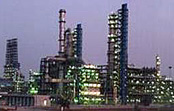Executive Summary

High Uptime and Maintainability Secured
by Full-fledged Automation Platform
at Indian Refinery
HPCL-Mittal Energy Limited (HMEL) is a joint venture between Hindustan Petroleum Corporation Limited and Mittal Energy Investment Pte Ltd, a Lakshmi N Mittal company that is based in Singapore. HMEL has built and currently operates the Guru Gobind Singh refinery, which is located near Bathinda in India's Punjab region. This new refinery has a production capacity of 9 million tons per annum (the equivalent of 180,000 bpd) and complies with the Euro IV emission norms. This is a zero bottom plant, with a very high Nelson Complexity Index. The refinery facilities include a polypropylene unit (PPU) that utilizes the Novolen® gas-phase polypropylene (PP) process and is capable of producing 440,000 tons per year of homo-polymer PP.
HMEL produces an entire range of PP homo-polymers. The refinery's state-of-the art delayed coker unit (DCU) produces a high sulfur petroleum coke (pet coke) derivative. The sulfur recovery unit produces very high quality sulfur in powder and lump form. The other notable deliverable is a high yield of environmentally friendly liquid petroleum gas (LPG) for household and commercial customers in the northern region of the country.
For the monitoring and control of the entire Guru Gobind Singh refinery, HMEL selected an integrated solution from Yokogawa consisting of the CENTUM VP state-of-the-art distributed control system, the ProSafe-RS safety instrumented system, the Plant Resource Manager (PRM) asset management system, the Exasmoc, Exarqe, and fitOMS advanced process control (APC) packages, FOUNDATION™ fieldbus instruments, and an operator training simulator (OTS). Yokogawa India oversaw and implemented their engineering, installation, and commissioning, and the refinery has performed flawlessly since coming online in early 2012.

The central control room
The Challenges and the Solutions
1. Maintenance
This full scale refinery has a total of nearly 12,000 field instruments. To ensure the efficient utilization and maintenance of these assets, HMEL decided to use the FOUNDATION fieldbus technology in tandem with the PRM asset management package. With this solution, personnel in the central control room can monitor the performance of these field assets and diagnose their condition. PRM also has a control valve signature analysis function. With these capabilities, the HMEL maintenance team is able to adopt a proactive maintenance approach whereby problems are spotted before a field device or control valve fails and maintenance can be scheduled to be performed at an opportune time. In addition to improving plant uptime, this eliminates the need for many manual checks of devices in the field, reducing field operator workload.
2. Safety
Safety is always a paramount concern at an oil refinery. ProSafe-RS is SIL-3 certified by TUV for the management of the emergency shutdown (ESD) system and the fire & gas system (FGS), and is fully integrated with the DCS. In addition to the many benefits of an integrated human machine interface (HMI) for DCS and ESD, the integration of DCS and ESD also allows the seamless exchange of signals between the DCS interlocks and the ESD logic, especially in the Poly Propylene units which requires many signals and status of ESD logics in the DCS controllers.
3. Efficiency and product quality
HMEL utilizes APC packages together with the DCS to improve efficiency and ensure the highest levels of product quality. The Exasmoc multivariable optimization controller and the Exarqe robust quality estimator are used to reduce the amount of steam consumed by the continuous distillation unit (CDU), DCU, and fluidized catalytic cracking unit (FCCU) and to help ensure the steady operation of the entire refinery.
Blending is the last step in the process of producing finished products from crude oil. Quality control for the finished products is one of the most important steps in the refining process. At the HMEL refinery, Yokogawa's fitOMS (future integration technology for oil movement system) APC solution works in conjunction with near infrared analyzers (NIR) to optimize mid sulfur (MS) oil blending and high speed diesel (HSD) blending. This ensures that the finished products are kept within the targeted blend ranges and that this is done in the most cost-effective way.
The package includes an OTS for a total of 10 process units. Built by Omega Simulation Co., Ltd., this is a DCS direct connect type OTS used in operator training that also can function as a DCS-programmable logic controller (PLC) to check out control strategies. The early delivery of the OTS ensured that the operators could familiarize themselves with the systems before the plant commissioning. The specific process units covered by the OTS are:
- CDU, vacuum distillation unit (VDU)
- Naphtha hydrotreater (NHT)
- Isomerization (ISOM) unit
- Catalytic reformer
- Diesel hydrotreater (DHDT)
- Vacuum gas oil – hydrotreater) (VGO-HDT)
- Fluidized catalytic cracking – propylene recovery unit (FCC-PRU)
- Polypropylene
- Hydrogen generation unit (HGU)
- DCU & sulfur recovery unit (SRU)
Client satisfaction parameters:
- Robust best-in-class DCS/PLC solution
- Robust, fast Vnet/IP network
- Control of field instruments on FOUNDATION fieldbus closed loops
- Integrated DCS/ESD PLC network
- Robust HMI used as direct node on DCS network
- Remote PLC I/O for hardwired console in CCR
- Able to perform PRM control valve signature analysis and partial stroke testing of shutdown valves from CCR
- Redundant ProSafe-RS architecture for both ESD and FGS, from I/O level to CPU
- ProSafe-RS sequence of events (SOE) functionality with 1-msec event resolution for trip analysis and troubleshooting
Project details:
| Total system tags: | 41,000 |
|---|---|
| Total DCS closed loops (conventional): | 2,350 |
| Total devices on FOUNDATION fieldbus: | 12,000 |
| Total FOUNDATION fieldbus segments: | 2,240 |
| Maximum number of devices per segment: | 9 |
| Total FOUNDATION fieldbus closed loops: | 1,210 |
| Total HMIs: | 82 |
| Total ESD and FGS PLC I/Os (ProSafe-RS): | 16,240 |
| Video wall size in main control room: | 48,854 mm (W) x 2,200 mm (H) (80 x 60" displays) |
Customer Satisfaction
P.S. Prasad, General Manager, Maintenance – Control & Instrumentation at HMEL, commented, "The CENTUM VP system supplied by Yokogawa forms a complete integrated network connecting all the process units and the central control room. Since its commissioning in 2012, the system has been very robust and has withstood all plant disturbances. PRM has proven to be an extremely effective maintenance tool as the majority of the closed loops are based on FOUNDATION fieldbus. The ESD and FGS systems designed to work with ProSafe-RS have performed as specified. Yokogawa has been very forthcoming with its support and maintenance of the integrated automation system, ensuring high uptime."

產業別
-
石油和天然氣下游
近年來,石油和天然氣下游產業面臨著越來越多的挑戰。這些挑戰包括待加工原料的特性變化、工業設施及設備的老化、能源成本的上升、缺乏能夠使煉油廠安全有效運行的熟練技術工人,以及市場和客戶的需求不斷變化。
多年來,橫河與許多下游公司合作,致力於提供應對這些挑戰和問題的工業解決方案。橫河的解決方案幫助工廠投資者盡可能實現最大的盈利能力和工廠內可持續的安全。 -
精煉
在不斷變化的市場中,煉油廠不僅是原油加工單位,而且是利潤中心。同時,人們強烈意識到煉油廠設施安全性的重要。為了實現盈利,效率及環境保護的長期目標,需要包括計劃,調度,管理和控制的總體生產解決方案。憑藉在自動化領域多年積累的專業知識,橫河可以為您提供經濟實惠的完善的整體解決方案,改善操作並使世界更清潔。
相關產品&解決方案
-
工廠資源管理系統 (PRM)
設備需要經過適當管理才能實現高可靠性和穩定的工廠運營。 PRM能幫助提升維護計劃的品質,並在整個工廠生命週期內將維護成本最佳化。
-
分散式控制系統(DCS)
我們的分散式控制系統 (DCS) 可自動化和控制製程,提高績效。 已經超過 10,000 家工廠利用Yokogawa DCS 實現生產目標。
